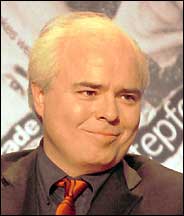homeopathy
The first major victory in the battle for the integrity of universities seems to have been won. This email was sent by Kate Chatfield who is module leader for the “BSc” in homeopathic medicine at the University of Central Lancashire (UCLAN).
| from Kate Chatfield…
Dear All, It’s a sad day for us here at UCLan because we have taken the decision not to run a first year this year due to low recruitment. The course will be put ‘on hold’ for this year and next until we see what happens with the general climate. Fortunately our masters course is thriving and we have been asked to focus upon this area and homeopathy research for the time being. Of late UCLan has been the subject of many attacks by the anti-homeopathy league. Colquhoun et al have kept the university lawyers and us quite fruitlessly busy by making claims for very detailed course information under the Freedom of Information Act. The latest demand is for 32 identified lesson plans with teaching notes, power points, handouts etc. The relentless attacks have taken their toll and it appears that they have won this small victory. The university has been very clear that this decision has been taken solely on the grounds of poor educational experience and is nothing to do with the current furore. They continue to be supportive of us and our efforts. Best wishes Kate and Jean |
There is some background here. In July 2006 I made a request to UCLAN under the Freedom of Information Act 2000, in which I asked to see some of their teaching materials. I appealed to UCLAN but Professor Patrick McGhee, Deputy Vice-Chancellor (Academic), also turned down two appeals. A letter sent directly to Professor Malcolm McVicar, vice-chancellor and president of UCLAN, failed to elicit the courtesy of a reply (standard practice I’m afraid, when a vice chancellor is faced with a difficult question). (Ironically, McVicar lists one of his interests as “health policy”.) So then I appealed to the Office of the Information Commissioner, in November 2006. Recently the case got to the top of the pile, and a judgment is expected any moment now.
Kate Chatfield’s letter to her colleagues is interesting. She describes a request ro see some of her teaching materials as an “attack”. If someone asks to see my teaching materials, I am rather flattered, and I send them. Is she not proud of what she teaches? Why all the secrecy? After all, you, the taxpayer, are paying for this stuff to be taught, so why should you not be able see it? Or is the problem that she feels that the “alternative reality” in which homeopaths live is just too complicated for mortals to grasp? Perhaps this attitude should be interpreted as flattering to the general public, because somewhere deep down she knows that the public will be able to spot gobbledygook when they see it. The revelation that the University of Westminster teaches first year undergraduates the “amethysts emit high yin energy” didn’t help their academic reputation much either.
Much credit for this decision must go also to the pressure from the many good academics at UCLAN. When it was revealed recently that UCLAN intended to open yet more courses in forms of medicine that are disproved or unproven, they naturally felt that their university was being brought into disrepute. Opposition to plans to introduce new “degrees” in acupuncture and Chinese herbal medicine were exposed in Times Higher Education recently. It particular, great credit must go to Dr Michael Eslea from UCLAN’s Psychology department. His open letter to his vice-chancellor is an example of scientific integrity in action.
The abandonment of this degree in medicines that contain no medicine is a small victory for common sense, for science and for the integrity of universities. Sadly, there is still a long way to go.
It is my understanding that ‘bringing the university into disrepute’ is a serious offence. Please note, vice-chancellor.
A few more judgments like that to suspend your homeopathy degree could work wonders for your reputation.
The follow-up
Watch this space.
The Guardian was quick off the mark -this story appeared on their education web site within 3 hours of my posting it “Homeopathy degrees suspended after criticism” by Anthea Lipsett. My comment there disappeared for a while because the Guardian legal people misunderstood the meaning of the last sentence. It’s back now, with blame allocated unambiguously to the vice-chancellors of the 16 or so universities who run this sort of course.
UCLAN’s web site seems to need some updating. The “BSc” in homeopathic medicine is still advertised there. as of 28 August.
UCLAN’s best ally. Dr Michael Eslea, has had some publicity for his attempts to rescue his university’s reputation. The story appeared in the “High Principals” column of Private Eye (Issue 1217, Aug 22, 2008). It also appeared in his local paper, the Lancashire Evening Post.
The Lancashire Evening Post catches up with homeopathy suspension story, two days after you read it here. But the UCLAN web site still advertises it.
My original piece on Integrative Baloney@Yale was posted on May 16th, after I got back from a visit there. The talk I gave there included a short video. My movie, Integrative baloney@Yale, was made entirely from clips taken from Yale’s own YouTube movies which showed something approaching three hours of its “1st Annual Scientific [sic] symposium”, entitled “Complementary and Alternative Medicine: Evidence for Integration”. I had merely interspersed a few titles to show the worst scientific absurdities of that rather pathetic event. YouTube removed the movie last week.
You can download the movie here [15.8 Mb, wmv file].
It should soon reappear on YouTube (actually it took over a month and several reminders, but eventually they kept their word in the end).
Yale’s lawyers had written to YouTube, to have my movie removed. I guess if you have no evidence, all you can do is resort to law to suppress the views of those who have the temerity to point out that the emperor is naked. Last week it was New Zealand Chiropractors’ Association Inc. This week the rather more substantial Yale University. We live in interesting times.
This is what I got on 15th August.
| Dear Member
This is to notify you that we have removed or disabled access to the following material as a result of a third-party notification by Yale University, Yale School of Medicine (CME) claiming that this material is infringing: Integrative baloney@Yale: http://uk.youtube.com/watch?v=HEl2fhfGBdI Please Note: Repeated incidents of copyright infringement will result in the deletion of your account and all videos uploaded to that account. In order to prevent this from happening |
If you clicked on the link you saw
“This video is no longer available due to a copyright claim by Yale University, Yale School of Medicine (CME)”
It seems that Yale’s Continuing Medical Education (CME) department was responsible.
Of course Yale is correct. I expect they own the copyright of their original movies, but they are not what I posted. I would argue that selecting 6 minutes from a 3 hour original amounts to “fair quotation”, no different from when one cites a short passage from somebody else’s book or paper. Perhaps Yale was just a bit jealous that my movie was getting viewed a lot more times than theirs. Or perhaps they were a bit peeved that a Google search for “Yale Integrative Medicine” produced my movie as #2 (add the word movie and I was #1).
My movie seems to me to be fair comment from someone who is a pharmacologist by trade. Apparently it didn’t seem that way to the apparatchiks of Yale Medical School, who seem to think that academic arguments should be settled by paying lawyers to suppress views they don’t like, rather than by rational discussion.
It’s interesting that the three hours of Yale’s own movie have also vanished from YouTube. Could that be because they realise that the remarks made at the meeting are so embarrassing intellectually that it would be better not to make them public? Actually, no.
What does Yale CME say?
Rather than publishing this straight away, I thought it better to delve a bit further into what had happened. I lodged an appeal with YouTube and I wrote to Ronald J. Vender, MD (Associate Dean, YSM Clinical Affairs, CMO, Yale Medical Group, Medical Director, Yale CME ). The outcome was rather interesting.
First, it turned out that the original posting of the three hours of the symposium proceedings on YouTube was itself unauthorised, which is why it suffered the same fate as my movie.
Dr Vender told me that he is new to the job, and didn’t know about the incident. What’s more surprising, he said he “did not know an Integrative Program even existed at Yale”. That does seem a bit odd indeed for an Associate Dean of Clinical Affairs.
However, Dr Vender turned out to be a very reasonable man,.After some amiable correspondence over the weekend, it took him only a day and a half to sort the matter out. After talking to Yale’s attorney, he wrote on 19th August, thus
“The University attorney believes that there is in fact a difference between the initial unauthorized filming of an entire conference as opposed to quoting from that conference. Therefore, she has agreed to withdraw the injunction that has been imposed on your use of the material. YouTube will be contacted.”
That’s good for me, but it isn’t the main thing. The movie would doubtless have been seen by more people if Yale had tried to maintain the ban. Much more impressively, Dr Vender also said
“As for this particular program, I will be speaking with Dr Belitsky and the program directors to encourage them to adopt a more critical view of the scientific basis for claims made by proponents of CAM. They will also be encouraged to develop a future program that includes faculty who have opposing points of view.”
It remains to be seen what actually happens, but so far, so good.
What next?
The removal of the original videos of the meeting is understandable because they were pretty embarrassing to Yale. But can that be the real reason? I was told that it is simply because their posting was “unauthorised”. But Yale Continuing Medical Education still boasts about the meeting on their own web site. They describe the meeting as “successful”, but if they are so proud of it, why remove the video from YouTube whether it was authorised or not? We are told
“The symposium, accredited for 7.5 AMA PRA Category 1 Credits, began what is hoped to be a long tradition at the Yale School of Medicine.”
They give credits for such miseducation?
Dr Katz’s phrase “we need a more fluid concept of evidence” now gets about 148 hits in Google, since I first helped him to publicise it.
Two of the six “learning objectives” that Yale CME lists for this symposium are particularly revealing.
- Describe therapeutic benefits and recent scientific evidence supporting a wide range of safe and practical complementary treatments, including acupuncture, massage, yoga, meditation, nutrition and exercise
- Identify and discuss barriers to CAM use, practice and research, as well as propose ways of overcoming these barriers
‘Describe the evidence supporting complementary treatments’? But don’t on any account describe the much more substantial evidence that does not support them? A question (or “learning objective”) put in this loaded way is the very antithesis of education.
Equally the second ‘learning objective’ carries with it the assumption that CAM works, otherwise why would anyone want to overcome the barriers to it?
This is indoctrination, not education. It betrays everything that a university should stand for.
Let’s hope the new head of CME, the admirable Dr Vender, succeeds in doing something about it
Follow-up
Success!. Well I think it is success. On 26 November 2008, the admirable Dr Vender wrote to me as follows.
“I do not know if another CAM/Integrative Medicine program is planned at Yale. However, based on the new ACCME standards, this program does not fulfil the standards for receiving CME accreditation (by my interpretation of the standards). At least one of last year’s program directors has been notified already.”
Samuel Hahnemann (1755 – 1843) was the originator of homeopathy. He was clearly a well-intentioned man.. There is good reason to believe that he thought dilution could not go on for ever, but he died 22 years before it became possible to calculate that his favourite 30C dilution already contained nothing at all.

| The bible of homeopaths is Hahnemann’s Organon der rationellen Heilkunde, “Organon of the Medical Art”. His views on dosage, as expressed in the six editions of this book are almost as self-contradictory as the other bible. Hahnemann’s writing about ‘vital spirits’ sounds very silly now, but it is language that was quite common at the end of the 18th century, before much was known about medicine or physiology. But his interest in chemistry was entirely sensible. | 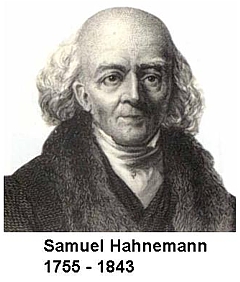 |
Before 1800 Hahnemann started out with the very high doses that were conventional at the time. Unlike most of his contemporaries, he was smart enough to realise that giving 50 g of antimony was killing people so he kept reducing the dose until it was no longer toxic. Unfortunately he (like almost everyone else at the time) didn’t know about controls so he mistook lack of toxicity (because the dose was zero) for a beneficial effect. Nonetheless, for most of his life he did not advocate the extreme dilutions that many modern homeopaths use routinely.
In The Life and Letters of Dr Samuel Hahnemann by Thomas Lindsley Bradford, M.D.(or see Google books edition of the Organon), there is an interesting passage. According to the edition here pp. 237 – 238), this was a note attached to para. #283 in the first edition of the Organon.
| ” The doctrine of the divisibility of matter teaches us that we cannot make a part so small that it shall cease to be something, and that it shall not share all the properties of the whole.” |
Here Hahnemann refers to the doctrine of divisibility, but appears to be saying that dilution can go on for ever. But he also says something that directly contradicts this view (Organon, Dudgeon’s translation see also here, page 239 ). The emphasis is mine.
| “I must say that these procedures seem to show chiefly how high one can go with the potentized attenuation of medicines without their action on the human health becoming nil.“ |
Although this claims that you can dilute a lot, it also admits that if the dilution goes too far the effect would eventually vanish, contrary to the usual homeopathic “principle” that it should keep getting stronger and stronger. and contrary to Hahnemann’s suggestions in other places that he thought matter was infinitely divisible.
This passage shows quite clearly that Hahnemann did not believe that his medicines would work if they were diluted so much that that there were no molecules left. That he believed this is confirmed by a letter that Hahnemann wrote in a letter to a Dr Schreter dated September 13th, 1829. This letter reprimanded Schreter for advocating extremely high dilutions.
| “there must be some limit to the thing. It cannot go on to infinity” The original German version was “Es muss ein Ende geben, es kann nicht bis ins Unendliche weitergehen” |
This confirms that Hahnemann was aware of, and accepted, that matter was not infinitely divisible and his medicines would not work if they contained nothing of the original material.
This attitude is actually not at all surprising, because Hahnemann was an educated man and he had a particular interest in chemistry. He cannot have failed to be aware of Dalton’s atomic theory, which was published between 1805 – 1810, while Hahnemann was writing the first edition of the Organon.
Peter Morrell, in Hahnemann and Homeopathy, says
“These were obviously developments that Hahnemann could not have failed to know about and indeed, was thoroughly excited about, It is clear from many of his asides that he regarded chemistry as the most important science.”
What is astonishing is that I can find no example of Hahnemann ever having mentioned Dalton or Avogadro. Perhaps he was a bit scared by the implications of their suggestions that molecules could not be divided without changing their nature.
The first edition of the Organon was published in 1810. but in the 5th edition appeared 1833, ten years before his death, These dates turn out to be important.
John Dalton (1776 – 1844) was able to estimate relative atomic masses of various molecules, the smallest unit that a chemical can exist in without losing irs identity. His values were soon improved by Amadeo
Avogadro (1776 – 1856), in 1811. Avogadro made the very important proposal that the volume of a gas (strictly, of an ideal gas ) is proportional to the number of atoms or molecules that are present. More precisely, the relationship between the masses of the same volume of different gases (at the same temperature and pressure) corresponds to the relationship between their respective molecular weights. Hence, the relative molecular mass of a gas can be calculated from the mass of a sample of known volume.
BUT neither Avogadro nor Dalton knew how many molecules there were in a given mass of a substance
This is absolutely crucial because it means that, although Hahnemann realised that there was a limit to the dilutions that could be used, he had no way of knowing what that limit was,

The answer to that question was discovered only in 1865, 22 years after the death of Hahnemann. It was discovered not by Avogadro, but by Johann Josef Loschmidt (1821 – 1895). It is Loschmidt, not Avogadro, who discovered the crucial numerical value of ‘Avogadro’s number‘, and in the German literature it is known, properly, as Loschmidt’sche Zahl.
This number is 6.022 x 1023 molecules per mole. One mole of a pure compound is its molecular mass in grams. The molecular mass of carbon (relative to hydrogen) is 12, so 12 grams of carbon contain 6.022 x 1023 carbon atoms. The molecular mass of of strychnine is 334.4 so 334.4 grams of strychnine contain 6.022 x 1023 strychnine molecules.
Armed with the numerical value of Avogadro’s number, it is easy to calculate that a 30 C homeopathic dilution contains nothing whatsoever. More precisely, it would contain, on average, a single molecule in spherical pill with a diameter equal to the distance from the earth to the sun.
But Hahnemann could not have known that. If had lived another 25 years he would almost certainly have renounced the idea of using 30 C dilutions.
He had a good excuse for getting it wrong. He was dead before the knowledge existed to do the calculation
But modern homeopaths have no excuse whatsoever for believing the impossible.
Hahnemann would have thought they were nuts, I suspect. He was too intelligent to believe that medicines that contain no medicine could be effective. In his words, “It cannot go on to infinity”.
Acknowledgement
I very grateful to ‘ Lindy’ for help in checking the references that are cited here, and for helpful discussions.
This, I fear, is pure plagiarism, Robert Shrimsley’s piece in today’s Financial Times was so funny that it just begged to be quoted. Here it is.
|
Surely this is a call to action. The news that Radovan Karadzic has been hiding out as some kind of homeopath has confirmed all prejudices about alternative medicine. I have had my doubts about this vicious breed ever since we were gulled into giving the kids valerian and hops to calm them down on an overnight flight and they went absolutely wild. Talk about a crime against humanity. Incidentally old Rad is not exactly an advert for homeopathy if this week’s photographs are anything to go by. Before he got into all this complementary healing, he was a sprightly, globally-feared warlord and international criminal. Now, after a decade of mixing his own marjoram, he is a strangely bearded hippy, blathering on about the need to nurture your inner self. Of course with hindsight health shops of the world were an obvious hiding place for genocidal maniacs. Remember all that talk of cleansing impurities? Well, I think we now know what that was all about. Some of you may be thinking that Karadzic was an aberration in an otherwise harmless community. But I ask you, how likely is it that the butcher of Belgrade could have kept up the pretence for so long without ever giving himself away. Were no suspicions aroused by the publication of his first book Radovan’s Remedies . Did no one notice that his patented treatment for stress prescribed ground echinacea root, essence of basil and the blood of a thousand Bosnians. Anyway, now that these collected homeopaths, herbologists and healers have finally been exposed as nothing more than a front organisation for the world’s most wanted, we will doubtless see swift action. How long can it be until the National Security Agency, operating undercover in Greenwich Village, finally pinpoints the precise location of Osama bin Laden’s reiki parlour? Crack teams of CIA operatives will surely be rounding up reflexologists in their search for Ratko Mladic. We can be confident that even now special rendition flights, crammed full of ayurvedic surgeons are en route to Guantánamo, where skilled interrogators will rearrange their chakras at no extra charge. Homeopaths will be forced to take two Disprins every four hours until they crack. US authorities have, however, pledged not to use the cruel practice of water-boarding – except perhaps on hydrotherapists. Of course we may snare a few, genuinely innocent aromatherapists on the way but as they say in the trade, you can’t make a poultice without grinding some ginger. |
We have often had cause to criticise Boots Alliance, the biggest retail pharmacist in the UK, because of its deeply unethical approach to junk medicine. Click here to read the shameful litany. The problem of Boots was raised recently also by Edzard Ernst at the Hay Literary Festival. He said
“The population at large trusts Boots more than any other pharmacy, but when you look behind the smokescreen, when it comes to alternative medicines, that trust is not justified.”
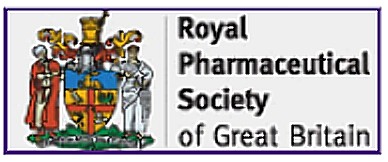
Ernst accused Boots of breaching ethical guidelines drawn up by the Royal Pharmaceutical Society of Great Britain, by failing to tell customers that its homeopathic medicines contain no active ingredients and are ineffective in clinical trials.
Another chain, Lloyds Pharmacy, are just as bad. Many smaller pharmacies are no more honest when it comes to selling medicines that are known to be ineffective.
Pharmacists are fond of referring to themselves as “professionals” who are regulated by a professional body, the Royal Pharmaceutical Society of Great Britain (RPSGB). It’s natural to ask where their regulatory body stands on the question of junk medicine. So I asked them, and this is what I found.
| 17 April, 2008
I am writing an article about the role of pharmacists in giving advice about (a) alternative medicines and (b) nutritional supplements. I can find no clear statements about these topics on the RPSGB web site. Please can you give me a statement on the position of the Royal Pharmaceutical Society on these two topics. In particular, have you offered guidance to pharmacists about how to deal with the conflict of interest that arises when they can make money by selling something that they know to have no good evidence for efficacy? This question has had some publicity recently in connection with Boots’ promotion of CCoQ10 to give you “energy”, and only yesterday when the bad effects of some nutritional supplements were in the news. |
Here are some extracts from the first reply that I got from the RPSGB’s Legal and Ethical Advisory Service (emphasis is mine).
| 28 April 2008
Pharmacists must comply with the Code of Ethics and its supporting documents. Principle 5 of the Code of Ethics requires pharmacists to develop their professional knowledge and competence whilst Principle 6 requires pharmacists to be honest and trustworthy. The Code states: 5. DEVELOP YOUR PROFESSIONAL KNOWLEDGE AND COMPETENCE At all stages of your professional working life you must ensure that your knowledge, skills and performance are of a high quality, up to date and relevant to your field of practice. You must: 5.1 Maintain and improve the quality of your work by keeping your knowledge and skills up to date, evidence-based and relevant to your role and responsibilities. 5.2 Apply your knowledge and skills appropriately to your professional responsibilities. 5.3 Recognise the limits of your professional competence; practise only in those areas in which you are competent to do so and refer to others where necessary. 5.4 Undertake and maintain up-to-date evidence of continuing professional development relevant to your field of practice. 6. BE HONEST AND TRUSTWORTHY Patients, colleagues and the public at large place their trust in you as a pharmacy professional. You must behave in a way that justifies this trust and maintains the reputation of your profession. You must: 6.2 Ensure you do not abuse your professional position or exploit the vulnerability or lack of knowledge of others. 6.3 Avoid conflicts of interest and declare any personal or professional interests to those who may be affected. Do not ask for or accept gifts, inducements, hospitality or referrals that may affect, or be perceived to affect, your professional judgement. 6.4 Be accurate and impartial when teaching others and when providing or publishing information to ensure that you do not mislead others or make claims that cannot be justified. |
And, on over-the counter prescribing
| In addition the “Professional Standards and Guidance for the Sale and Supply of Medicines” document which supports the Code of Ethics states:
“2. SUPPLY OF OVER THE COUNTER (OTC) MEDICINES STANDARDS When purchasing medicines from pharmacies patients expect to be provided with high quality, relevant information in a manner they can easily understand. You must ensure that: 2.1 procedures for sales of OTC medicines enable intervention and professional advice to be given whenever this can assist the safe and effective use of medicines. Pharmacy medicines must not be accessible to the public by self-selection. |
Evidence-based? Accurate and impartial? High quality information? Effective use?
These words don’t seem to accord with Boots’ mendacious advertisements for CoQ10 (which were condemned by the ASA).
Neither does it accord with the appalling advice that I got from a Boots pharmacist about Vitamin B for vitality.
Or their bad advice on childhood diarrhoea.
Or the unspeakable nonsense of the Boots (mis)-education web site.
Then we get to the nub. This is what I was told by the RPSGB about alternative medicine (the emphasis is mine).
| 8. COMPLEMENTARY THERAPIES AND MEDICINES
STANDARDS You must ensure that you are competent in any area in which you offer advice on treatment or medicines. If you sell or supply homoeopathic or herbal medicines, or other complementary therapies, you must: 8.1 assist patients in making informed decisions by providing them with necessary and relevant information. 8.2 ensure any stock is obtained from a reputable source. 8.3 recommend a remedy only where you can be satisfied of its safety and quality, taking into account the Medicines and Healthcare products Regulatory Agency registration schemes for homoeopathic and herbal remedies.” Therefore pharmacists are required to keep their knowledge and skills up to date and provide accurate and impartial information to ensure that you do not mislead others or make claims that cannot be justified. |
It does seem very odd that “accurate and impartial information” about homeopathic pills does not include mentioning that they contain no trace of the ingredient on the label. and have been shown in clinical trials to be ineffective. These rather important bits of information are missing from both advertisements and from (in my experience) the advice given by pharmacists in the shop.
If you look carefully, though, the wording is a bit sneaky. Referring to over-the-counter medicines, the code refers to “safe and effective use of medicines”, but when it comes to alternative medicines, all mention of ‘effectiveness’ has mysteriously vanished.
So I wrote again to get clarification.
| 29 April, 2008
Thanks for that information. I’d appreciate clarification of two matters in what you sent. (1) Apropros of complementary and alternative medicine, the code says 8.3 recommend a remedy only where you can be satisfied of its safety and quality I notice that this paragraph mentions safety and quality but does not mention efficacy. Does this mean that it is considered ethical to recommend a medicine when there is no evidence of its efficacy? Apparently it does. This gets to the heart of my question and I’d appreciate a clear answer. |
This enquiry was followed by a long silence. Despite several reminders by email and by telephone nothing happened until eventually got a phone call over a month later (May 3) from David Pruce, Director of Practice & Quality Improvement, Royal Pharmaceutical Society of Great Britain. The question may be simple, but the RPSGB evidently it hard, or more likely embarrassing, to answer.
When I asked Pruce why para 8.3 does not mention effectiveness, his reply, after some circumlocution, was as follows.
Pruce: “You must assist patients in making informed decisions by providing necessary and relevant information . . . we would apply this to any medicine, the pharmacist needs to help the patient assess the risks and benefits.”
DC: “and would that include saying it doesn’t work better than placebo?”
Pruce “if there is good evidence to show that it may, but it depends on what the evidence is, what the level of evidence is, and the pharmacist’s assessment of the evidence”
DC “What’s your assessment of the evidence?”
Pruce, “I don’t think my personal assessment is relevant. I wouldn’t want to be drawn on my personal assessment”. “If a pharmacist is selling homeopathic medicines they have to assist the patient in making informed decisions”
“I don’t think we specifically talk about the efficacy of any other medicine” [DC: not true, see para 2.1, above]
“We would expect pharmacists to be making sure that what they are providing to a patient is safe and efficacious”
DC “So why doesn’t it mention efficacious in para 8.3”
Pruce “What we are trying to do with the Code of Ethics is not go down to the nth degree of detail ” . . . “there are large areas of medicine where there is an absence of data”
DC “Yes, actually homeopathy isn’t one of them. It used to be.”
Pruce. “uh, that’s again a debatable point”
DC I don’t think it’s debatable at all, if you’ve read the literature
Pruce. “well many people would debate that point” “This [homeopathy] is a controversial area where opinions are divided on it”
DC “Not informed opinions”
Pruce “Well . . . there are also a large number of people that do believe in it. We haven’t come out with a categorical statement either way.”
I came away from this deeply unsatisfactory conversation with a strong impression that the RPSGB’s Director of Practice & Quality Improvement was either not familiar with the evidence, or had been told not to say anything about it, in the absence of any official statement about alternative medicine.
I do hope that the RPSGB does not really believe that “there are also a large number of people that do believe in it” constitutes any sort of evidence.
It is high time that the RPSGB followed its own code of ethics and required, as it does for over-the-counter sales, that accurate advice should be given about “the safe and effective use of medicines”.
“The scientist on the High Street”
The RPS publishes a series of factsheets for their “Scientist in the High Street” campaign. One of these “factsheets” concerns homeopathy, [download pdf from the RPSGB]. Perhaps we can get an answer there?
Well not much. For the most part the “factsheet” just mouths the vacuous gobbledygook of homeopaths. It does recover a bit towards the end, when it says
“The methodologically “best” trials showed no effect greater than that of placebo”.
But there is no hint that this means pharmacists should not be selling homeopathic pills to sick people..
That is perhaps not surprising, because the Science Committee of the RPSGB copped out of their responsibility by getting the factsheet written by a Glasgow veterinary homeopath, Steven Kayne. You can judge his critical attitude by a paper (Isbell & Kayne, 1997) which asks whether the idea that shaking a solution increases its potency. The paper is a masterpiece of prevarication, it quotes only homeopaths and fails to come to the obvious conclusion. And it is the same Steven Kayne who wrote in Health and Homeopathy (2001)
“Homeopathy is not very good for treating bacterial infections directly, apart from cystitis that often responds to a number of medicines, including Berberis or Cantharis”.
So there is a bacterial infection that can be cured by pills that contain no medicine? Is this dangerous nonsense what the RPSGB really believes?
More unreliable advice
While waiting for the train to Cardiff on April 16th (to give a seminar at the Welsh School of Pharmacy), I amused myself by dropping into the Boots store on Paddington station.
| DC I’ve seen your advertisements for CoQ10. Can you tell me more? Will they really make me more energetic?
Boots: Yes they will, but you may have to take them for several weeks. DC. Several weeks? Boots: yes the effect develops only slowly Peers at the label and reads it out to me DC I see. Can you tell me whether there have been any trials that show it works? Boots. I don’t know. I’d have to ask. But there must be or they wouldn’t be allowed to sell it. DC. Actually there are no trials, you know Boots. Really? I didn’t think that was allowed. But people have told me that they feel better after taking it. DC You are a pharmacist? Boots. Yes |
Sadly, this abysmal performance is only too typical in my experience, Try it yourself.
The malaria question
After it was revealed that pharmacists were recommending, or tolerating recommendations, of homeopathic treatment of malaria, the RPSGB did, at last. speak out. It was this episode that caused Quackometer to write his now famous piece on ‘The gentle art of homeopathic killing‘ (it shot to fame when the Society of Homeopaths tried to take legal action to ban it) Recommending pills that contain no medicine for the treatment or prevention or treatment of malaria is dangerous. If it is not criminal it ought to be [watch the Neals Yard video]. .
The RPSGB says it is investigating the role of pharmacists in the Newsnight sting (see the follow-up here). That was in July 2006, but they are stlll unwilling to say if any action will be taken. Anyone want to bet that it will be swept under the carpet?
The statement issued by the RPSGB, 5 months after the malaria sting is just about the only example that I can find of them speaking out against dangerous and fraudulent homeopathic practices. Even in this case, it is pretty mild and restricted narrowly to malaria prevention.
The RPSGB and the Quacktioner Royal
The RPSGB submitted a response to the ‘consultation’ held by the Prince’s Foundation for Integrated Health, about their Complementary Healthcare; a guide for patients.
| Response by the Royal Pharmaceutical Society of Great Britain Dr John Clements, Science Secretary “We believe that more emphasis should be given to the need for members of the public who are purchasing products (as opposed to services) to ask for advice about the product. Pharmacists are trained as experts on medicines and the public, when making purchases in pharmacies, would expect to seek advice from pharmacists” |
So plenty of puffery for the role of pharmacists. But there is not a word of criticism about the many barmy treatments that are included in the “Guide for Patients”. Not just homeopathy and herbalism, but also Craniosacral therapy, Laying on of Hands, chiropractic, Reiki, Shiatsu –every form of barminess under the sun drew no comment from the RPS.
I can’t see how a response like this is consistent with the RPS’s own code of ethics.
A recent president of the RPSGB was a homeopath
| Christine Glover provides perhaps the most dramatic reason of all for thinking thst, despite all the fine words, the RPSGB cares little for evidence and truth The NHS Blogdoctor published “Letter from an angry pharmacist”. | 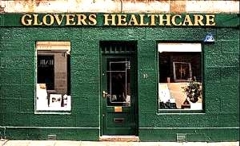 |
Mrs Glover was president of the RPSGB from 1999 to 2001, vice-president in 1997-98, and a member of the RPSGB Council until May 2005. She is not just a member, but a Fellow. (Oddly, her own web site says President from 1998 – 2001.)
So it is relevant to ask how the RPSGB’s own ex-president obeys their code of ethics. Here are some examples on how Ms Glover helps to assist the safe and effective use of medicines. . Much of her own web site seems to have vanished (I wonder why) so I’ll have to quote the “Letter from an angry pharmacist”., as revealed by NHS Blogdoctor,
“What has Christine got to offer?
- “We offer a wide range of Homeopathic remedies (over 3000 different remedies and potencies) as well as Bach flower remedies, Vitamins, Supplements, some herbal products and Essential Oils.”
- Jetlag Tablets highly recommended in ‘Wanderlust’ travel magazine. Suitable for all ages.
- Wind Remedy useful for wind particularly in babies. In can be supplied in powder form for very small babies. Granules or as liquid potency.
- Udder Care 100ml £80.00 One capful in sprayer filled with water. Two jets to be squirted on inner vulva twice daily for up to 4 days until clots reduced. Discard remainder. Same dose for high cell-counting cows detected.
Udder Care? Oh! I forgot to say, “Glover’s Integrated Healthcare” does cows as well as people. Dr Crippen would not suggest to a woman with sore breasts that she sprayed something on her inner vulva. But women are women and cows are cows and Dr Crippen is not an expert on bovine anatomy and physiology. But, were he a farmer, he would need some persuasion to spend £80.00 on 100 mls of a liquid to squirt on a cow’s vulva. Sorry, inner vulva.”
Nothing shows more clearly that the RPSGB will tolerate almost any quackery than the fact that they think Glover is an appropriate person to be president. Every item on the quotation above seems to me to be in flagrant breach of the RPSGB’s Code of Ethics. Just like the Society of Homeopaths, the code seems to be there merely for show, at least in the case of advice about junk medicine..
A greater role for pharmacists?
This problem has become more important now that the government proposes to give pharmacists a greater role in prescribing. Needless to say the RPSGB is gloating about their proposed new role. Other people are much less sure it is anything but a money–saving gimmick and crypto-privatisation.
I have known pharmacists who have a detailed knowledge of the actions of drugs, and I have met many more who haven’t. The main objection, though, is that pharmacists have a direct financial interest in their prescribing. Conflicts of interest are already rife in medicine, and we can’t afford them.
Conclusion
The Royal Pharmaceutical Society is desperately evasive about a matter that is central to their very existence, giving good advice to patients about which medicines work and which don’t. Pharmacists should be in the front line in education of the public, about medicines, the ‘scientist on the High Street’. Some of them are, but their professional organisation is letting them down badly.
Until such time as the RPSGB decides to take notice of evidence, and clears up some of the things described here, it is hard to see how they can earn the respect of pharmacists, or of anyone else.
Follow-up
Stavros Isaiadis’ blog, Burning Mind, has done a good piece on “More on Quack Medicine in High Street Shops“.
The Chemist and Druggist reports that the RPSGB is worried about the marketing of placebo pills (‘obecalp’ -geddit?). It does seem very odd that the RPSGB should condemn honest placebos, but be so very tolerant about dishonest placebos. You couldn’t make it up.
A complaint to the RPSGB is rejected
Just to see what happened, I made a complaint to thr RPSGB about branches of their own Code of Ethics at Boots in Hexham and in Evesham. Both of them supported Homeopathy Awareness Week These events had been publicised in those particularly unpleasent local ‘newspapers’ that carry paid advertising disguised as editorial material. In this case it was the Evesham Journal and the Hexham Courant.
Guess what? The RPSGB replied thus
“Your complaint has been reviewed bt Mrs Jill Williams and Mr David Slater who are both Regional Lead Inspectors. Having carried out a review they have concluded that support of homeopathic awareness week does not constitute a breach of the Society’s Code of Ethics or Professional Standards.”
In case you have forgotten, the Professional Standards say
2.1 procedures for sales of OTC medicines enable intervention and professional advice to be given whenever this can assist the safe and effective use of medicines.
The RPSGB has some very quaint ideas on how to interpret their own code of ethics
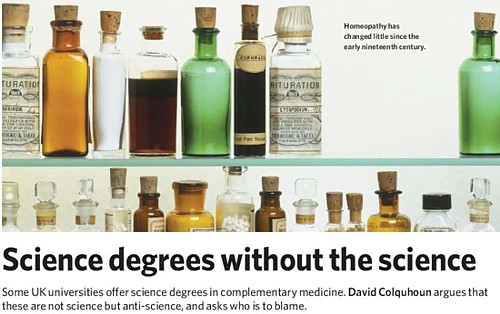
The Nature title picture was ‘Taken from The Complete Guide to Homeopathy, © Dorling Kindersley Ltd’ (not a recommended text book at UCL)
Nature (March 22 2007) ran this commentary, alongside a News item by Jim Giles:
Download a reprint of the article here.
Download the while 2005 westminster University miasmatic exam paper here.
Degrees in homeopathy slated as unscientific
and a Nature podcast [listen to podcast].
Here is some of the coverage of this commentary (more soon, including some of the abuse). A transcript pf the podcast is here.
Interview on the BBC’s Today Programme, with Edward Stourton.
Listen to interview
Material World (BBC Radio 4). This excellent science programme, presented by Quentin Cooper, had a longer version of DC versus David Peters (Westminster University). There was helpful intervention from Michael Marmot who had talked, in the first half of the programme, about his longitudinal population studies. [listen to part 2].
Radio 5 Live interview.
BBC London News (BBC1 TV), An interview of DC and Peter Fisher
by the News Presenter, Riz Lateef. Dr Fisher, who is clinical director of the Royal London Homeopathic Hospital, made a very interesting comment, at the end of a discussion about whether homeopathy was a suitable subject for a science degree.
| Riz Lateef (presenter): “Dr Fisher, could you ever see it [homeopathy] as a science degree in the future? Dr Peter Fisher: “I would hope so. I wouldn’t deny that a lot of scientific research needs to be done, and I would hope that in the future it would have a scientific basis. I have to say that at the moment that basis isn’t comprehensive. To that extent I would agree with Professor Colquhoun.” |
Download the movie (5.9 Mb .wmv file: (quotation is at the end)
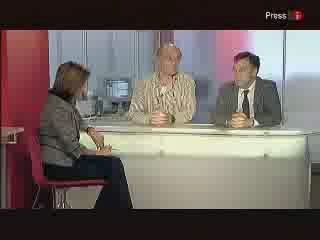 ]
]
A shorter version of the movie, showing only the quotation at the end has appeared on YouTube.
Evidence? During the interview, Peter Fisher said
“. . .if you look in the Cochrane library, . . . you will find that there are two treatments for flu that appear to be effective, and one of them is homeopathic”
I presume this refers to the Cochrane review “Homoeopathic Oscillococcinum for preventing and treating influenza and influenza-like yndromes”. What this actually says is
“Trials do not show that homoeopathic Oscillococcinum can prevent influenza. However, taking homoeopathic Oscillococcinum once you have influenza might shorten the illness, but more research is needed.”
Well, it might, but even if it did, the average length of the putative “shortening” of the illness was a mere 0.28 days, i.e. 6.7 hours. To call that “effective” seems to me to be just a tiny bit of an exaggeration.
The newspapers
“Faith-based degree ‘damages science’ ”
Mark Henderson, Science Editor, The Times. I love that title: it says it all.
Homeopathy science degrees ‘gobbledygook’
Ian Sample, science correspondent, The Guardian.
Alternative medicine degrees ‘anti-scientific’
Roger Highfield, Science Editor, in the Daily Telegraph
Universities ‘are duping students with homeopathy science degrees’
Steve Connor, science correspondent The Independent
Less than complementary? James Morgan in the Glasgow Herald
Alternative therapy degree attack
UK universities are teaching “gobbledygook” following the explosion in science degrees in complementary medicine, a leading expert says. BBC News web site
University homoeopathy degrees ‘gobbledygook’, claims Professor
Fiona McRae in the Daily Mail.
and the story even got into the free London papers, Metro and The London
Paper
And some from abroad
British health expert brands homeopathy ‘gobbledygook’
From ‘our correspondent’ at DailyIndia.com.
Homeopathic Degree in Britain Puts Scientific Gloss on Nonscientific Dross, Critics Say
Susan Brown in The Chronicle of Higher Education (USA)
UK Fight Over Anti-Science in Medicine
Dr Steven Novella comments in the NeuroLogica Blog, part of the New England Skeptical Society site.
Some follow up
A matter of degree. Why the letters after a homoeopath’s name really do count
Mark Henderson, 24th March, in The Times (Body and Soul section)
Ann Robinson, in the Guardian’s Comment is Free (Sunday 25th March) gives me a bit of a slagging off. But her piece is followed by a flood of comments, almost all of them thoroughly sensible. One comment, from ‘Midas’ ends thus.
So why not homeopathy alongside medicine? Right. Why not Levitation alongside Aeronautical Engineering?
And the blogs: quite a lot of blogs picked up the story.
Thanks to everyone who sent letters of support, not least the regular scientists from Westminster, and University of Central Lancashire who are clearly rather embarrassed by their homeopathic colleagues.
Inevitably there were a few bits of hate mail too, each answered politely, and some even resulting in a degree of agreement. The only one worth quoting is a rather mild one from George Lewith (see below).
| “Do you realise that your own university (University College London) offers a BSc in architecture? I have yet to find that this particular course (from personal experience) involves a single piece of science. You might like to investigate at the Bartlett.” . . .”I suggest you make a formal complaint to your Provost, the Dean of the Medical School, and the committee of UK Vice-Chancellors of Medical Schools. You must know that you are completely out of sync but perhaps you don’t? Kind regards George |
I guess one of us is out of sync anyway. Unlike George (it appears), I know little about architecture, but the idea of design for a tower block based on homeopathic principles sounds a bit scary to me.
Twenty-five hospitals from London and southern and eastern England have already either stopped sending any patients to the Royal London Homeopathic Hospital or agreed to fund only a handful A campaign has started o save it, but the arguments are far from convincing.
This is reposted from the original IMPROBABLE SCIENCE page
The news is out. It was in February this year when I first saw some “Commissioning Intentions 2007-08” documents from several London NHS Primary Care Trusts (PCT), indicating their intention to break their contracts with the RLHH on the very reasonable grounds that homeopathy doesn’t work. It seemed better to wait for the intentions to be implemented before saying much, because of the inevitable outcry from those who want sugar pills at the taxpayers’ expense.
Then, in March 2007, the Health Services Journal carried a story “PCTs consider alternative to homeopathic hospitals” (free registration, or read it here).
|
On 8 April 2007, The Observer carried a special report, prominently featured on page 3.
|
 Fisher and Queen, Observer 8 April 2007 |
Peter Fisher, clinical director of the RLHH, is quoted as saying
“Twenty-five hospitals from London and southern and eastern England have already either stopped sending any patients to the RLHH or agreed to fund only a handful.”
“Prince Charles is sympathetic, supportive and concerned. But he doesn’t feel it’s appropriate to intervene in any way because there’s been some adverse publicity before about him ‘meddling’. ”
Fisher attributes this to the letter sent to PCTs by 13 of us, last May, in which we advocated that the NHS should not be paying for “unproven or disproved treatments”. The leading signatory on this letter, Professor Michael Baum, is quoted in the Observer thus.
“If the Royal London were to close because of PCT deficits we would scarcely miss it”.
“Homeopathy is no better than witchcraft. It’s no better than a placebo effect. It’s patronising and insulting for adults.”
“Instead you could have a centre for palliative and supportive care, which would be of greater benefit and involve half the cost. Rather than losing something, we would gain something.”
The backlash
The reaction seems to have started with a letter from homeopath Carol Boyce. Her letter starts thus.
| ROYAL LONDON HOMEOPATHIC HOSPITAL UNDER SIEGE “Death by stealth. The Royal London Homeopathic Hospital (RLHH) – the visible presence of homeopathy within Britain’s NHS – an institution putting homeopathy in the public mind for the last 150 years – the place where homeopathy was seen to perform so well in the cholera epidemic of the 1840s – is being dealt a DEATH BLOW” |
I’d guess the very first sentence must be something of an embarrassment to the RLHH’s clinical director, who is far too sensible to believe that cholera can be cured by homeopathic sugar pills.
The red herring about cholera is repeated ad nauseam on hundreds of homeopathy sites (though most are curiously silent about whether they really believe that sugar pills can cure cholera). It is based on the report that during the London Cholera epidemic of 1854, of the 61 cases of cholera treated at the London Homeopathic Hospital, 10 died (16.4%), whereas the neighbouring Middlesex Hospital reported 123 deaths out of 231 cases of cholera (53.2%). Apart from the lack of any knowledge of the state of the patients on entry to hospital, it was also the case at the time that conventional medicine was no more based on evidence than homeopathy. Indeed the initial popularity of homeopathy could well have resulted not only from wishful thinking, but also because doing nothing at all (i.e. homeopathy) was less harmful than blood letting. The fallacy of the argument was spotted very early on by Oliver Wendell Holmes (senior) in his famous essay, Homeopathy and its Kindred Delusions.
But medicine moved on and homeopathy didn’t. The history of cholera, like that of tuberculosis, contrary to what is suggested by homeopaths, is a triumph for evidence based medicine. The epidemic was halted not by homeopaths but by the careful observations of John Snow that led to his removing the handle of the Broad Street pump. If medicine had been left to homeopaths, people would still be dying of these diseases.
Carol Boyce invites you to write directly to Queen Elizabeth II, to save the RLHH. She has also started an e-petition on the UK government site. The petition includes the words
| ROYAL LONDON HOMEOPATHIC HOSPITAL UNDER SIEGE
“The RLHH has been part of the Health Service for 150 years. ” “In 2005, 67% of GPs and 85% of practices in it’s [sic] Primary Care Trust, referred patients to the hospital. The hospital provides effective and most importantly, COST-EFFECTIVE treatments.” |
Ms Boyce seems not to have noticed that the Prince of Wales’ own Smallwood report decided that there was not enough evidence to come to firm conclusions about cost-effectiveness.
Peter Fisher himself has appealed for the survival of the RLHH in a letter dated 9 March 2007 [download copy of letter].
“The Royal London Homoeopathic Hospital needs your support
09/03/2007By Dr. Peter Fisher, Homeopath to Her Majesty, the Queen.
There is no silly talk about cholera here, but there is a useful list of Trusts who have decided to abandon "unproven and disproved treatments". Fisher recommends you to read Marcia Angell’s book to learn about the deficiencies of the drug industry. I recommend that too. I also recommend Dan Hurley’s book on the even greater deficiencies of the quackery industry.
Fisher suggests you write to your MP to prevent closure of the RLHH.
I suggest you write to your MP to support closure of the RLHH.
There’s no remedy for the Prince of Quacks
This is the title of a piece by Francis Wheen in the London Evening Standard, 16 May 2006. Francis Wheen is the author of the Top ten delusions.
“Prince Charles travels to Geneva next week to deliver the keynote speech at the annual assembly of the World Health Organisation. Some mistake, surely?” “The WHO describes Charles as the president of the Prince’s Foundation for Integrated Health and “patron of a number of health charities”. It omits to add that his views on medicine are barmy – and pernicious. ”
“WHO delegates from 192 nations have plenty to discuss during their five-day meeting – HIV/Aids, sickle-cell anaemia, preparations for a flu pandemic, the eradication of polio and smallpox. Why waste precious time listening to the heir to the British throne, who has spent more than 20 years displaying his ignorance of medical science?”
“The prince has never met a snake oil vendor he didn’t like. A couple of years ago he urged doctors to prescribe coffee enemas to cancer patients, a suggestion which provoked this rebuke from Professor Michael Baum of University College London: “The power of my authority comes with a knowledge built on 40 years of study and 25 years of active involvement in cancer research. Your power and authority rest on an accident of birth.” ”
The Prince’s Foundation for Integrated Health publishes Complementary healthcare: a guide for patients which is full of wishful thinking. For example, it tells the unfortunate patient that
“Homeopathy is most often used to treat chronic conditions such as asthma; eczema; arthritis; fatigue disorders like ME; headache and migraine; menstrual and menopausal problems; irritable bowel syndrome; Crohn’s disease; allergies; repeated ear, nose, throat and chest infections or urine infections; depression and anxiety.”
but says nothing at all about whether or not they work. That is just irresponsible. And to describe pills that contain no trace of the substance on the label as ”very diluted” is plain dishonest .
This item was transferred from the old IMPROBABLE SCIENCE page.
Trust Boots
Boots the Chemists (now Alliance Boots) is a very big business in the UK. There have 1,450 pharmacies in the UK and employ over 100,000 people.
I posted the item below a while ago, on the old Improbable Science page. I thought it deserved a bit more publicity, for the following reason. The quackometer has posted about Boots too,
I mentioned it during the debate with Felicity Lee at the British Pharmaceutical Conference (2007) (Ben Goldacre’s interview with Felicity Lee is a gem). After the talk I was approached by two heavies. Well, two men in dark suits anyway. It turned out that one was from Boots and the other from Alliance Pharmacies, now merged to form Boots Alliance. They seemed rather bothered by the fact that I’d criticised Boots, but were not entirely unreasonable. They claimed to be on the scientific side and said they’d investigate the matter. I wrote to the Boots man on 10 September, but got no reply, After a reminder on 29 October, I got this.
| Dear David Thank you for your email and reminder. We have investigated the points you raised in your blog. I was informed that it was an old leaflet and has not been reprinted (to my knowledge). However on a point of principle, I have raised the wider issue of clinical validity in my department. This will take its course through to the commercial/buying team. |
| Dear David Thank you for pointing this out. I’ve had a quick look and it is an educational website looking at all aspects of medicine and therapy, including alternative medicine. It is not a direct sales message to the public. I hope this helps |
Corporate Social Responsibility
Boots web site makes a big point about Corporate Social Responsibility (CSR)
“TRUST BOOTS
As you may have noticed, that’s the tagline which in 2005 we adopted as the sign-off to all our advertising. But it’s much more than just a slogan. It’s a concise statement of our entire corporate strategy. Our aim is to make Boots the world’s best health and beauty retailer, and we’re 100% clear that the unique trust in which we are held provides the key to achieving this. Which means, of course, that those two words are also the rationale for all our CSR activities. Everything we do that builds trust is good for our business; anything which could compromise it, a risk we can’t afford to take.”
Trust Boots to provide straight answers.
At one time. Boots were sufficiently ethical not to deal in homeopathy. But no longer.
When asked for evidence that the things they sell actually work, the Boots help desk is astonishingly coy, as related here (thanks to ebm-first.com for giving publicity to this report).
When Boots were asked about their ‘Alternatives Hayfever Relief Tablets’, the answer came, after some delay, “This is a homeopathic product, further information on homeopathic products is available from the Nelson company who make this
particular product for Boots. ” This company has been making homeopathic products for many years and
may well be able to help you further. You may also find general
information about homeopathic medicines in reference books in the public
library”. The email address that they gave me for Nelson’s did not work, and writing to another Nelson’s address produced no reply at all. Clearly any letter that contains the word “evidence” arouses suspicion and is simply deflected.
Dangerous advice from Boots: a small sting.
I have been into several Boots stores, sought out the most senior pharmacist that I can find, and asked them the following question. “I have a 5 year old son who has had diarrhoea for three days now. Please can you recommend a natural remedy”. The response was interesting. In every case but one, the pharmacist reached for a copy of the Boots pamphlet on homeopathy, and thumbed through it, while desperately, but unsuccessfuly, trying to retain an air of professional authority. Then one or another homeopathic treatment from the booklet was recommended. In only one case out of six did the pharmacist even mention the right answer (GP and rehydration). One pharmacist, who turned out to have qualified in Germany, was very insistent that homeopathic treatment was inappropriate and that I should should start rehydration and take the child to the GP. The other five, including one who had an impressive-looking badge saying “consultant pharmacist”, did not even mention rehydration.
Conclusion The education of the pharmacists was clearly insufficient for them to give reliable advice. On the contrary, their advice was downright dangerous.
Miseducation by Boots the chemists
Boots also run an “educational” web site for children, the ‘Boots learning store’. Click on the section for ‘pupils’, and then ’16+’ and you find their education about alternative medicine (do their pharmacists do this course, I wonder?). The slide show that follows is an insult to human intelligence,
|
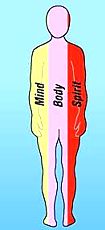 |
Then follows a totally misleading slide about enzymes.
There is nothing wrong with the enzyme bit, but the analogy with homeopathy is baseless and misleading. Enzymes don’t work when there are no molecules present.
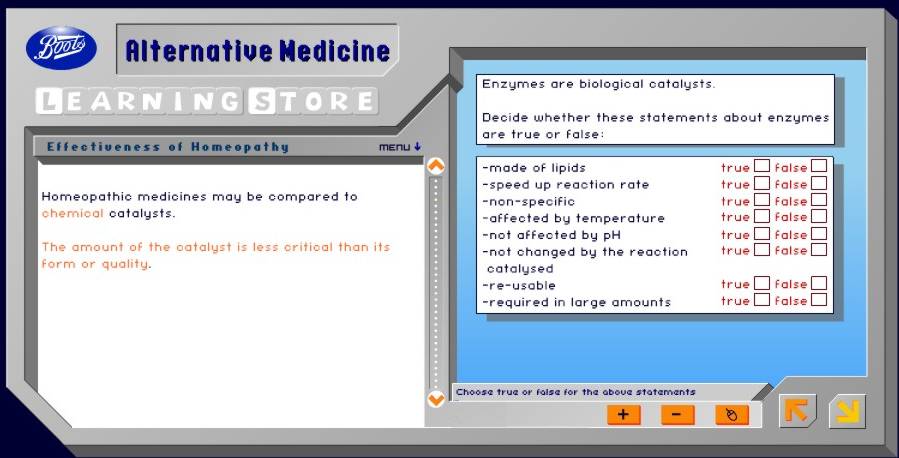
But in the next slide, enzymes and catalysts are forgotten anyway, This is how it works.

This meaningless mediaeval gobbledygook about ‘vital forces’ is being peddled as ‘education’ by the biggest retail pharmacy chain in the UK. What hope is there for kids?
But there is more. Now for the exam. If you click on the ‘teacher’ section you can download the students’ notes and the test. The ‘Student Notes’ include the following direct claim that homeopathy can cure diseases.

Now take the test, Here is question 1, and the answer.
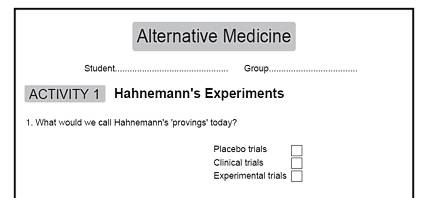
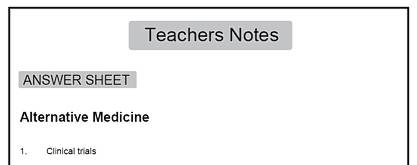
I suppose that if the educators at Boots classify Hahnemann’s provings as a ‘clinical trial’ it goes a long way to explain the quality of their learning store, and the quality of the advice given by their pharmacists.
Boots Alternatives also sells a “snoring remedy”
The evidence for effectiveness of this herbal product is very dodgy, as described here earlier. This was an interesting saga that involved bad statistics, inappropriate controls and concealed financial interests. It eventually appeared on the BBC Radio 4 programme, You and Yours.
Postcript: “Nurses and pharmacists are to be given greater powers to prescribe drugs”
The foregoing history does not give one much confidence in the government’s latest money-saving wheeze. [BBC]
“The latest measures mean nurses and pharmacists will be able to prescribe treatments for more serious conditions such as heart disease and diabetes – traditionally the domain of GPs.
Health Secretary Patricia Hewitt said: “Nurse and pharmacist independent prescribing is a huge step forward in improving patient accessibility to medicines from highly skilled and well trained staff.”
And Chief Pharmaceutical Officer Dr Keith Ridge added: “For pharmacists, this is the dawn of a new era. It will help transform the public’s perception of pharmacy and the services they deliver to patients.”
This item was first posted on the original IMPROBABLE SCIENCE page.

